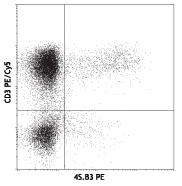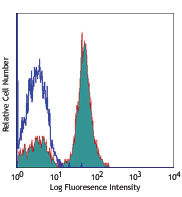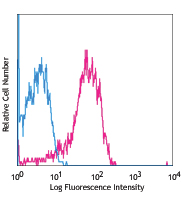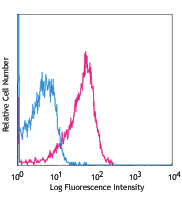- Regulatory Status
- RUO
- Ave. Rating
- Submit a Review
- Product Citations
- publications
| Cat # | Size | Price | Quantity Check Availability | Save | ||
|---|---|---|---|---|---|---|
| 420701 | 1 mL | 44€ | ||||
Monensin is a protein transport inhibitor commonly used to enhance intracellular cytokine staining signals by blocking transport processes during cell activation. Especially useful for the intracellular staining of cytokines, monensin leads to the accumulation of most cytokines at the Golgi Complex/Endoplasmic Reticulum (see Jung, et al., 1993). Optimal conditions for use are cell type and time-dependent. Typically, protein transport inhibitors are included during in vitro cell activation cultures for 4-24 hours prior to harvest (see references below for additional information). Monensin Solution is supplied as a 1,000X solution, which should be diluted to 1X in cell culture medium.
Product DetailsProduct Details
- Formulation
- Monensin Solution is supplied as a 1000X working solution in 70% Ethanol. Dilute to 1X in cell culture medium.
- Concentration
- 2.0 mM
- Storage & Handling
- Store the solution between 2°C and 8°C. Monensin is known to be toxic; avoid direct body contact. Ethanol is flammable; keep away from sources of fire.
- Application
-
ICFC - Quality tested
- Recommended Usage
-
Dilute the 1000X solution to 1X in the tissue culture medium. It is recommended that cells are cultured with monensin for ≤ 24 hours, as this can become toxic for cell viability.
- Application References
-
- Smeltz RB. 2007. J. Immunol. 178:4786.
- Fuse S, et al. 2007. J. Immunol. 178:5227.
- Durkin ET,et al. 2008. Blood 10:1182.PubMed
- Durkin ET, et al. 2008. Blood 112:5245. PubMed
- Liu XS, et al. 2009. J. Immunol. 183:51. PubMed
- Mattarollo SR, et al. 2010. J. Immunol. 184:1242. PubMed
- Yang M, et al. 2010. J. Immuonl. 184:3321. PubMed
- Mattarollo SR, et al. 2010. J. Immunol. 184:5663. PubMed
- Wood MW, et al. 2011. Infect Immun. 79:708. PubMed
- Janune D, et al. 2011. FEBS Lett. 585:3033. PubMed
- Fiorenza S, et al. 2012. J. Immunol. 189:5622. PubMed
- Asgari E, et al. 2013. Blood. 122:3473. PubMed
- Li D, et al. 2013. Clin Immunol. 149:411. PubMed
- Bunse CE, et al. 2013. PLoS One. 8:77925. PubMed
- Product Citations
-
Antigen Details
- Antigen References
-
1. Current Protocols in Immunology (John Wiley & Sons New York) Unit 6.24 Detection of Intracellular Cytokines by Flow Cytometry (Barbara Foster and Calman Prussin NIAID NIH Bethesda MD).
2. Sander B, et al. 1991. Immunol. Rev. 119:65.
3. Sander B, et al. 1993. J. Immunol. Meth. 166:201.
4. Prussin C, et al. 1995. J. Immunol. Meth. 188:117.
5. Jung T, et al. 1993. J. Immunol. Meth. 159:197. - Gene ID
- NA
Related Pages & Pathways
Pages
Related FAQs
- How do I choose monensin or Brefeldin A solution?
-
Generally, Brefeldin A is more toxic for longer term incubations, so for shorter stimulations (6 hrs or less) use Brefeldin A. For longer stimulations use monensin. We recommend optimization for each cell type and protocol.
Customers Also Purchased

 Login / Register
Login / Register 











Follow Us